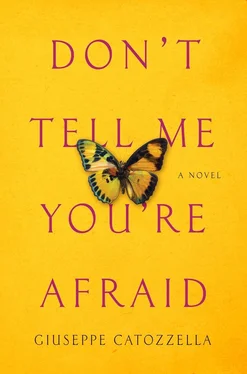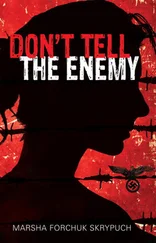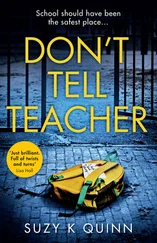But it wasn’t; it was all real.
I was crushed by what I had done.
If Hooyo tried to say something to me, I didn’t even hear her. I was terrified at the thought of having betrayed my best friend. I felt like a bad person, someone I didn’t know. I felt like I was capable of betraying my own mother, or even Hodan or Aabe. Like I was capable of betraying anyone. Including myself.
Finally, around six, Alì and his father showed up. The weight that was overwhelming me evaporated. Right away I searched for some sign in Alì’s eyes. But there was nothing except the usual veil of sadness and detachment.
As soon as he arrived, he went straight to his room, head bowed. He passed me with barely a hello.
I followed him and explained what had happened: I told him he was in danger, I warned him about Ahmed, I showed him the cut on my thigh.
He wasn’t surprised.
Instead he replied with something that I hadn’t expected: “Nassir has left our house. My brother has moved away.”
I was dumbfounded. “What do you mean, he left your house? What does that mean?”
“Last night, after supper, he admitted to Aabe that he has joined Al-Shabaab. He’s been spending time with them for years. That much we knew. But yesterday he said that he wants to go to the Koranic school, to be an active member of the organization. He’s decided to follow Ahmed.”
I remained silent while Alì sobbed. When he stopped crying, he told me not to worry, that Ahmed wouldn’t do anything to him, that Nassir would protect him.
There was a strange light in Alì’s eyes as he spoke, however. As if he were elated, inspired. A light that I had never seen before, that scared me.
We fell silent; then he asked me if I could leave him alone for a while.
I left the room and went to Hooyo, who was in the courtyard starting to set up the burgico for supper. I tried to act like nothing was wrong, asking my mother if I could help her, but my motions were as clumsy as an elephant’s.
After a while Alì came out and climbed the eucalyptus with those precise, soundless, velvety movements that made him look like a cat or a monkey. He knew that tree by heart; he knew exactly where to place his bare toes without even looking.
In no time he was at the top.
The place where no one could reach him. His place. Maybe the only one. He would come down when he got over it.
Even though Alì told me not to worry, I was miserable. I had betrayed my best friend, and that feeling stung more than the blade. That night, watching Alì swiftly scale the tree with those fluid, perfect movements of his, I felt even more alone than I had when confronted by Ahmed, who had wanted to cut my leg.
I stayed down there, leaning against the wall of his room for a while, waiting for him. Then I went to bed, my head under a very dark cloud.

AFTER A FEW DAYS everything was back to normal, and as usual Alì and I avoided talking about what had happened. Things fell into place in a silence that suited us both.
That period marked the time when I started winning for real. I participated in all the races that were held in and around the city — those that could be entered for free — and I almost always came in first.
I soon felt the need to look for additional challenges and signed up for competitions open to athletes of southern Somalia. I won there too.
Everyone wondered how a skinny little girl, thin as a newly planted acacia, with legs that looked like olive branches, could possibly win. The fact is that I won, and that’s that. I was faster than the others. At least the ones I happened to come across.
As the months passed, I realized that my specialty was the two hundred meters.
It was there that I was able to give my best. Though even in the four hundred meters I felt pretty confident. I didn’t have muscles suitable for burning it all up in a hundred meters; I needed a little more distance to work off the fury and let Aabe’s words take shape in my head. I couldn’t do it right away, as soon as I took off. At the start, there was only drive.
After three or four seconds, however, the promise I’d made to Aabe emerged, and I would win.
Every time.
I wanted to become the strongest sprinter in all of Somalia, which meant going to run in the north, in Hargeysa, Somaliland. But it wasn’t easy, because I needed someone to accompany me; then too I didn’t have any money, and neither did Alì. Besides that, the north had declared itself independent, its people saying they hated the war; so anyone who wanted to go north, even just for a race, wasn’t well regarded by the armed groups.
Moreover, just at the time when Nassir decided to follow Ahmed, everything changed in Mogadishu.
Al-Shabaab had gained a lot of power, and there was talk of opening the Islamic Courts. The alleged intent was to put an end to the war, but in reality it was merely a victory for the fundamentalists.
Within a few weeks, life in the city became impossible. Especially for women, though not only for them.
Then, in a single day, what should never happen anywhere happened.
In one day, a day like any other, with nothing on the horizon, no cataclysms or revolutions.
From one day to the next everything changed.
Overnight, listening to music was forbidden. You couldn’t listen anymore, either in the street or at home. The few who owned a radio had to keep the volume very low, because if a few notes were to drift outside they would risk a public lynching.
Overnight, all the movie theaters were shut down. Not that I’d ever had the money to go, but there had always been the hope that someday it would happen, and that alone was worth waiting for. Besides, there had always been some well-off classmate who would go there on Fridays with her family and come back with those wonderful, magical stories. Films created and fed people’s dreams; that’s why the theaters were shut down.
Overnight, men were obliged to wear long pants and could no longer be seen on the street in shorts. They also had to shave their heads completely or wear their hair long, Afro style, with long, full beards. Half measures were no longer acceptable.
Then there were the women. Women were no longer allowed to do anything; even walking down the street was risky. Trying it without a burka was a gamble that could cost you your life.
Overnight, the traditions of our country changed. The land of sunshine and color was transformed into an open-air training camp for extremists. None of our colorful garbasar, jamar, and hijab were permitted anymore. Suitable only for mopping the floor. We were obliged to wear the black burka, the garment that covers everything but your eyes.
But the worst thing of all, because it seemed like a punishment, was the decision to turn off the few streetlamps that at night lit up some of the city’s squares and side streets.
In the evening, in fact, many people gathered in the squares under the streetlights to read. Very few had electricity at home. Instead of reading by the dim light of the ferus, many spent their evenings under the stars, reading a novel, an old newspaper, or maybe a letter or a love note.
Those places were our outdoor library. Now, like the library itself, everything was precluded, revoked, banned.
Al-Shabaab had managed to demolish the hope of an entire people. Everything that until that day had been difficult to achieve but possible had become impossible. Dreams, hopes, and freedom had all been wiped out in the blink of an eye.
Overnight.
One night Aabe could wear his khaki shorts, the kind from colonial days that the Italians had imported and that all men wore, especially on very hot days. The next morning it was forbidden: If he were to run into Al-Shabaab’s watchdogs on the street, he’d risk being beaten in front of everyone.
Читать дальше





![Ally Carter - [Gallagher Girls 01] I'd Tell You I Love You But Then I'd Have to Kill You](/books/262179/ally-carter-gallagher-girls-01-i-d-tell-you-i-lo-thumb.webp)







